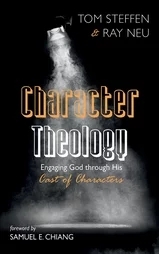Review of “Character Theology: Engaging God through His Cast of Characters” by Steffen and Neu
The book “Character Theology: Engaging God through His Cast of Characters” by Tom Steffen and Ray Neu, published 2024, is a book that I highly recommend to missionaries, church leaders, and theologians alike, despite the frank admission that the book is not really written for me. I think I need to explain this.

If it was written for me, it could have started out as “Hey. You know how people are designed by God to think in terms of verbal language, metaphors, and stories; and that it is primarily in stories— characters, setting, and plot— that God reveals Himself to us?” I would then respond back to the book (as I often do) “Why yes I do!” Then, the book would go forward with some additional insights with examples and practical advice. Such a book might only be about one third as long.
The book, however, was written for a very different audience. It is written for the “Western” Evangelical Christian who sees the Bible primarily as a collection of doctrines and that the Christian faith is best transmitted by teaching them as (propositional) truth statements. Such readers are apt to see stories as mere illustrations of such principles (at best), see the written word as clearly superior to the spoken, and look on narrative theology with deep suspicion. To counter this, Steffen and Neu go to great lengths to reference a copious number of theologians and Biblical scholars to challenge such presuppositions.
Character Theology is an extension of the Honor/Shame and Orality movements that have been transforming missions. The book appears in many ways to be the natural follow-on to two of Steffen’s recent books: “Worldview-based Storying” (2018) and “The Return of Oral Hermeneutics” (2020).
Despite the book not really being written for me, I appreciated the breadth of the book as it deals with orality instruction, storying, hermeneutics, and more to bring the reader to the main thesis— the power of instructing using Biblical stories and questions, with the focus on Biblical characters in interactive study groups.
I will admit that I am uncertain of the appropriateness of the title “Character Theology.” I wonder if “Character Criticism” is more appropriate. After all, it is in many ways learning about God through analyzing the characters in the Bible. However, it is more than analysis and interpretation. It is also instruction, evangelism, and theological development. Perhaps Character Theology is the best description.
I do highly recommend the book. The practical activity of the book of Jonah was hugely helpful, as was the interviewing of the story listeners and the story facilitator. Perhaps other examples would make it even better. A book promoting stories can certainly benefit from more stories. I would love to hear how different orality groups would deal with a very nuanced story like “Rizpah and King David” (II Samuel 21) or “Elisha and the Two Bears” (II Kings 2).
The book is available in paperback or Kindle and is published by Pickwick Publications.
The Book is Available HERE.



